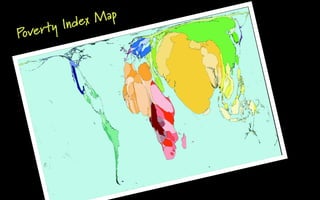Paul Collier - The Bottom Billion
- 3. Eco nomic traps
- 4. Escape the traps
- 6. Conflic miscon t s ception s
- 7. ral re source Natu rap t
- 8. The Dutch D isease Gas field discovery Currency Trade & Manufacturing
- 9. trap gover nance Bad
- 10. A bad overn ment g 't tra nsform won itself
- 11. Landlo cked wi th bad nei ghbors
- 12. Unlock!
- 13. 6z g l/x24 /goo. - http:/ frica o uth A for S iative y Init o ci e t en S ? Op an we do?! W hat c
- 14. pport human Su capital
- 15. Impro ve aid po licies
- 16. prove trade Im policies
- 17. ranspa rency T codes
- 18. fGb .gl/fo ://goo - http nnica Brita pedia cyclo ? En nflict pport st-co su Po
- 19. M ilitary interv ention ??
- 20. Paul Collier The Bottom Billion
- 21. credits Book: http://www.amazon.com/The-Bottom-Billion-Poorest-Countries/dp/0195311450 Creative commons pictures - by-nc-sa / by-sa / by-nc-nd: http://www.worldmapper.org/images/hires/174_human_poverty-ea-cart.tif http://www.flickr.com/photos/jennfarr/3967961775/ http://www.flickr.com/photos/abardwell/82371497/ http://www.flickr.com/photos/teachandlearn/2869194454/ http://www.flickr.com/photos/100sf/5378210928 Thank you! http://www.flickr.com/photos/aljazeeraenglish/5916374376/ http://www.flickr.com/photos/h2oalchemist/414924312/ http://www.flickr.com/photos/worldeconomicforum/4585682533/ http://www.flickr.com/photos/davidz/822970543 http://www.flickr.com/photos/mysteriousphotographer/114914023/ http://www.flickr.com/photos/csis_er/4879790122/ http://creativecommons.org/licenses/by-nc-sa/3.0/
Editor's Notes
- 1 billion people cannot exit poverty condition from which is difficult to escapeWhy the poorest countries are failing and what we can do about it
- Mainly photogenic issues are tackled by global politics- But is a problem that really affects us- We need to start from compassion - Huge disparity is also a danger for "us" and our children Poverty must we solved from withinĪŁ but we can influence and support.
- negative economic condition from which is difficult to escapelike economic black holesis just probabilistic but difficult and complex causality
- we "assume" that growth is better than this situation 4 traps -> many fall in a "mix/combination" of the next 4 conditions
- Conflict trap - Civil wars more than international wars Biggest and more persistent of the trap: like Zaire, Libya, Kosovo, Sri Lanka, Sudan and many otherstied with economic decline : halve the starting income of the country and you double the risk of civil wardependency on a single commodity exports: rebels funded by export companies, Nigeria rebels founded by diaspora groups
- not tied with ethnic minority discriminations political repression income inequality colonial history
- Natural resource trap ©C Oil NigeriaOwned by few peopleirrational public spending > difficult to reduce needs a very good governance autocracies seems more efficient than democracies in governing those resource democracies very easily get messed up corruption, patronage and bribery need free press Dutch disease
- Dutch disease 1959 Netherlands discovery of a large natural gas field Scholteren increase in revenues from natural resources currency increases, inflation causes decline in other manufacturing
- Bad governance - in a small country Zimbabwe ©C MugabeVery controversial figureLand reform 1979white farmers, who made up less than 1% of the population, owned 70% of the best farming land.land redistribution was blocked for a period of 10 yearsAccompanied with corruption and bribery
- Hastings Banda - 1961 to 1994 ©C fighting against colonialism for Malawi independence - villains with self interests deformed politics and premises potential turnaround may happen when heroes should come from inside support the heroes after post conflicts quick intervention forces
- Landlocked trap ©C Central Republic of AfricaHostages of bad neighboursno access to sea no effective transport infrastructures tied with the neighboureconomtspill over effect Can be circumvented with Increasing spillover helping improve neighbours policies Improve coastal access Heaven for services eg: financial IT and tech services Encourage remittances from migrants Local rural development Attract aid ?to survive
- Can be circumvented with - UgandaIncreasing spillover helping improve neighbours policies Improve coastal access Heaven for services eg: financial IT and tech services Encourage remittances from migrants Local rural development Attract aid ?to survive
- Sustainable and definitive solutions can come only from INSIDEHow do we create the condition?How can we support?
- Education > but than people tend to emigrate Rent skilled people for mentoring
- Improve budget support There is a lot of waste! Transparency and policies aid with ex-post conditions aid as skills and capacity building aid through specific projects
- Trade policies protect from Asia foster diversification money transfers transparency Avoid private capital to be sent in developed countries eg: villains with a bank account in switzerlanddo not accept corrupt money strong opposition to companies bribing for resources
- Transparency eg: is missing for oil companies eg: internal bottom-up scrutiny
- Sustainable and definitive solutions can come only from INSIDEHow do we create the condition?How can we support?
- Strongly biased by public opinion Never intervene is wrong Sudan / Darfur Rwanda Somalia ... Keep post-conflict peace Protect against coups
- Paul Collier,Director for the Centre for the Study of African Economies at The University of OxfordDirector of the Development Research Group of the World Bank





















